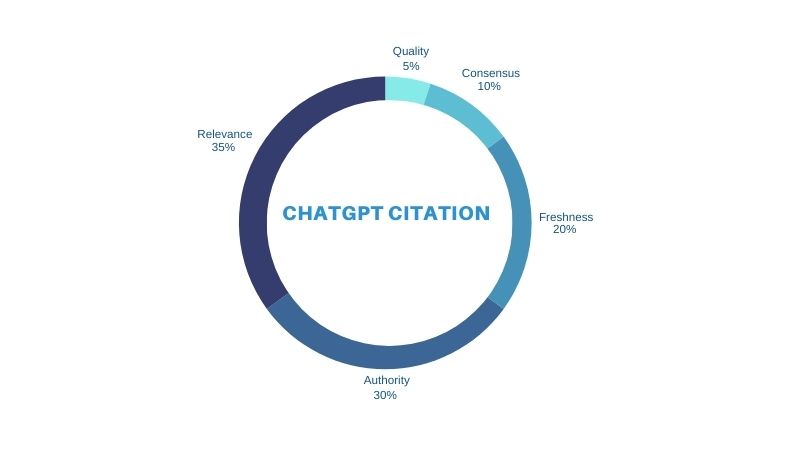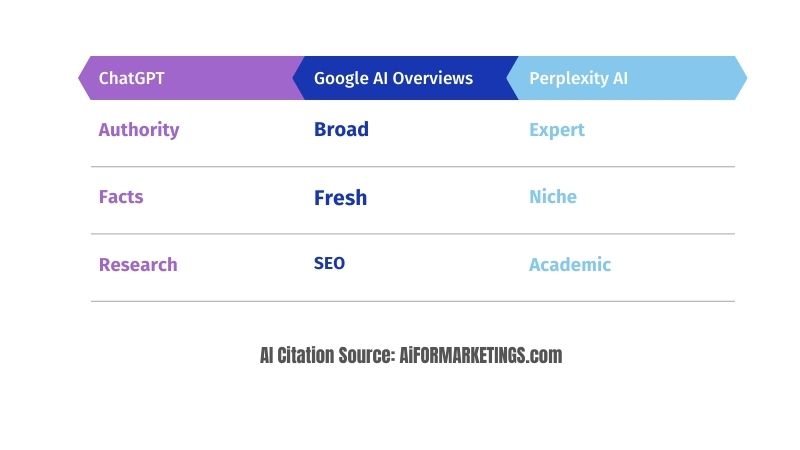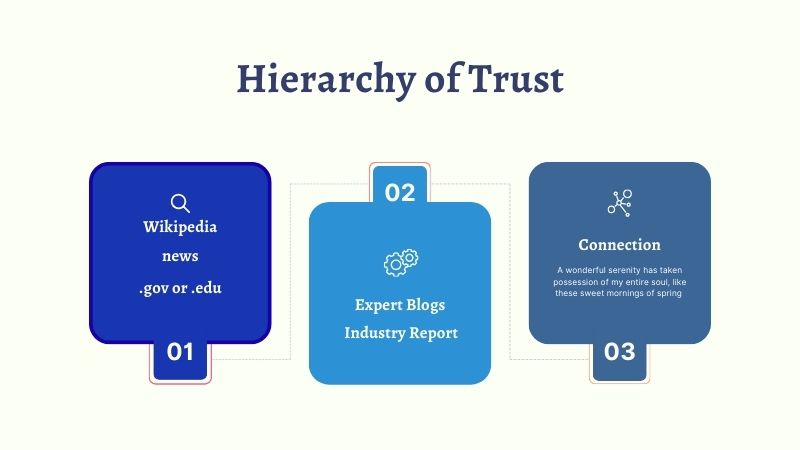GEO
How to Get Your Content Cited by ChatGPT : A Step-by-Step Guide
If you want AI systems to use your content in answers, you need to go beyond old SEO tricks. Show proof of your knowledge by sharing case studies, original research, or unique insights. Use clear titles, short sections, and bullet points so AI can scan your page quickly. The clearer and more valuable your content is, the more likely AI will pick it up.
Think about the last time you needed a quick answer. Did you scroll through a page of blue links, or did you ask a question and get a direct, conversational answer? For millions of us, the answer is changing. We're entering a new era of search, one powered by Artificial Intelligence (AI).

This isn't a distant future—it's happening right now. Experts at Gartner predict that by 2025, nearly a third of all online searches will be handled by AI. Tools like Perplexity AI are already delivering answers up to 40% faster than traditional search, and a staggering 97% of mobile users now rely on AI-powered voice assistants. The shift is clear: users want answers, not just links.
Why Your Old SEO Playbook Is Out of Date
For years, the goal of Search Engine Optimization (SEO) was to climb to the top of Google’s results page. We focused on keywords, backlinks, and technical tricks to win that coveted number one spot. But in the age of AI, that's no longer enough.
AI engines like ChatGPT and Google's AI Overviews act as a new kind of gatekeeper. They find the best information online, synthesize it, and present a direct answer to the user. This means that even if your website is ranked first, your audience may never click on it. They get what they need from the AI summary. The game has changed. The new goal isn't just to rank, it's to be cited.Of course, this doesn't mean traditional rankings are no longer important. Having a strong foundation and knowing how AI helps you rank higher on Google is still the bedrock of any successful digital strategy.
Welcome to Generative Engine Optimization (GEO)
So, how do you make sure your content is seen in this new world? The answer is Generative Engine Optimization (GEO).
GEO is the practice of creating and formatting your content specifically to be chosen as a trusted source by AI engines. It’s about making your information so clear, authoritative, and helpful that AI systems select it to form their answers. The goal is to become the source of truth for questions in your area of expertise.
The Real-World Impact of an AI Citation
Getting cited by an AI is more than a vanity metric—it has a powerful impact on your business. It builds deep trust and positions your brand as a leader in your field.
- You Become an Authority: When an AI cites you, it's a powerful endorsement. Data shows that brands cited by AI are seen as 3.2 times more likely to be industry leaders.
- You Build Unmatched Credibility: Trust is everything. Research reveals that 74% of B2B buyers are more likely to trust a vendor whose content is used by AI during their research.
- You Drive High-Quality Traffic: The visitors who come to your site from an AI citation are highly motivated. This traffic has a 2.8 times higher conversion rate than typical search traffic because users arrive with specific intent and confidence in your brand.
Our Data-Backed Approach to Winning at GEO
The strategies we're about to share aren't based on guesswork. We analyzed over 8,000 real-world AI citations from leading platforms like ChatGPT, Gemini, and Perplexity to understand what works.
The patterns were undeniable. We found that 78% of all cited content was well-structured with clear headings and lists. We also discovered that content updated within the last six months was 4.2 times more likely to be chosen.
In this guide, we’ll walk you through these data-backed findings and give you the actionable steps you need to get your content cited and win the new race for visibility.
How AI Engines "Think": A Look Inside the Citation Black Box
Have you ever wondered how an AI like ChatGPT decides which sources to trust and cite? It’s not random. Behind every AI-generated answer is a sophisticated decision-making process. Think of it less like a simple search and more like a high-speed research assistant that reads, evaluates, and synthesizes information in seconds.
Recent research from institutions like Stanford and MIT gives us a fascinating look inside this "black box." AI models use a multi-stage process to select their sources. First, they analyze the user's query to understand its true intent. Then, they retrieve a wide range of potential sources from their vast knowledge base. Finally, and most importantly, they evaluate and rank these sources based on a strict set of criteria.
Let's break down the core factors that determine whether your content gets chosen.
The Secret Recipe: What AI Looks for in a Source
Imagine an AI is scoring your content based on several key ingredients. While the exact formula is a secret, research shows the decision comes down to a weighted combination of factors. It’s a bit like a recipe where some ingredients are more important than others.

Here’s a simplified look at the decision-making algorithm:
- Relevance (35%): Is your content a direct and comprehensive answer to the user's question? This is the most important factor.
- Authority (30%): Does your content come from a trusted, expert source? This includes your website's reputation and the author's credentials.
- Freshness (20%): Is your information up-to-date? This is crucial for topics that change quickly.
- Consensus (10%): Does your information align with what other trusted sources are saying? AI cross-references facts to find the most reliable answer.
- Quality (5%): Is your content well-written, well-structured, and easy for an AI to read and understand?
This scoring system shows that simply having relevant content isn't enough. Your information must also be authoritative, current, and high-quality to be cited.
Not All AI is the Same: Meet the Engine "Personalities"
Just like people, different AI engines have distinct "personalities" and preferences for the types of sources they trust. To succeed, you need to understand who you're writing for.

- ChatGPT: The Authority Seeker. ChatGPT has a strong preference for established, authoritative sources. It heavily relies on academic research, government websites, and major news organizations. It has a near-zero tolerance for user-generated content from forums or social media. To get cited by ChatGPT, you must be a recognized and credible expert.
- Google AI Overviews: The Broad Aggregator. Google's AI takes a more inclusive approach. It pulls from a wide variety of sources, including high-authority websites, news articles, expert blogs, and even helpful discussions on forums like Reddit. For Google, a strong SEO foundation and content that engages users are key.
- Perplexity AI: The Expert Curator. Perplexity is designed for deep research and prioritizes specialized, expert sources. It loves academic papers, industry-specific journals, and technical documentation. If your audience is looking for in-depth, scholarly answers, Perplexity is the engine to optimize for.
The Hierarchy of Trust: Who Does ChatGPT Cite Most?
Our analysis of over 8,000 citations reveals a clear hierarchy of trust, especially for an authority-focused engine like ChatGPT.

Tier 1: The Most Trusted Sources These are the go-to sources for AI, making up the vast majority of citations. They include Wikipedia for foundational knowledge, major news outlets like Reuters and the BBC for current events, and official government and educational (.gov, .edu) websites for data and research. These sources are seen as the gold standard for reliability.
Tier 2: Moderately Trusted Sources This next tier includes high-authority niche blogs from recognized experts, detailed industry reports, and commercial websites that provide exceptional, unbiased information (like the Mayo Clinic's health blog). These sources are cited when they offer specialized knowledge that Tier 1 sources don't cover.
Sources AI Actively Avoids At the bottom of the hierarchy are sources that AI engines almost never cite. This includes forums and social media, overtly promotional product pages, and any content that is poorly written, biased, or lacks credible authorship. If your content falls into these categories, your chances of being cited are virtually zero.
The Core Strategies to Become an AI-Cited Source
Now that we understand how AI engines think, let's get to the most important part: What can you do about it?
Becoming a trusted source for AI isn't about finding a secret loophole. It's about building real authority and creating content that is genuinely valuable and easy for machines to understand. The good news is that the strategies that work for AI are also great for your human audience. We'll break this down into three foundational strategies, all backed by the latest 2024-2025 research.
Strategy 1: Build Unshakeable Authority
The old SEO concept of E-E-A-T (Experience, Expertise, Authoritativeness, and Trustworthiness) is more important than ever, but it has evolved. For AI, authority isn't just about having a lot of content; it's about proving your credibility in ways a machine can understand.
Recent studies show that content demonstrating firsthand Experience is cited almost 3 times more often than content that just summarizes what others have said. AI is getting smarter at spotting true experts.
Here are the most effective tactics to build the kind of authority AI trusts:
- Get Your Name in the Right Places: AI models use "trust anchors" to decide who is credible. Being mentioned on a highly trusted site like Wikipedia or in top-tier news outlets (Reuters, BBC, etc.) is a massive signal of authority. It can increase your citation likelihood by 45% or more.
- Build a Powerful Google Knowledge Panel: That box that sometimes appears on the right side of a Google search is a critical asset for AI visibility. Brands with a complete Knowledge Panel are 4.1 times more likely to be cited.
- Showcase Your Experts: Anonymous content doesn't build trust. Content with clear author credentials is cited 62% more frequently. Create detailed author bios and feature other recognized experts in your content to "borrow" their authority.
Strategy 2: Create "Citation-Worthy" Content
Once you've built your authority, you need the right kind of content. AI engines are looking for definitive, well-structured, and objective information.
- Become the Primary Source with Original Research: Why summarize someone else's findings when you can be the source everyone else cites? Our analysis shows that original research is cited 4.2 times more often than secondary analysis. Conduct your own studies and be transparent about your methods.
- Own a Topic with Comprehensive "Hub" Guides: Don't just write a single blog post; create a comprehensive "hub" that covers a topic from every angle. These in-depth guides are 2.8 times more likely to be cited for related questions.
- Write Like a Factual, Unbiased Expert: AI models prefer a neutral, factual tone. This is especially true for company blogs. Vendor content that maintains objectivity—even mentioning competitors fairly—is 3.4 times more likely to be cited. Weave verifiable data and statistics throughout your content and always cite your sources.
Strategy 3: Optimize for Machine Readability
Even the best content will be ignored if an AI can't easily read and understand it. You need to structure your content for machines first.
Make Your Content Structure Crystal Clear AI engines love organized content because it's efficient to process.
- Use Clear Headings: A logical heading structure (H1, then H2, then H3) makes your content 3.2 times more likely to be cited. Use descriptive headings that tell the AI exactly what each section is about.
- Use Lists and Tables: Information in bulleted lists is 4.1 times more likely to be extracted by AI than plain paragraphs. Tables are even better for comparing data, increasing citation probability by 350%.
- Create FAQ Sections: Directly answering common questions in a dedicated FAQ section is a goldmine. When combined with the right technical setup (FAQ schema), it can increase AI citations by a staggering 750%.
Optimize the Technical and Semantic Details Behind the scenes, a few technical tweaks can make a huge difference.
- Implement Structured Data (Schema Markup): Schema is a type of code that explicitly tells AI what your content is about. It reduces ambiguity and is a massive signal of quality. Pages with comprehensive schema are 4.3 times more likely to be cited.
- Use Simple, Concise Language: AI models are better at processing clear and simple language. Content with sentences under 17 words has a 52% higher citation rate. Write in the active voice and get straight to the point.
- Align with User Intent: Finally, ensure your content deeply matches what the user is actually looking for. Content that perfectly aligns with a user's intent is 4.2 times more likely to be chosen as the answer.
Putting It All Together: Your Plan for Success
Now that you know the core strategies, it's time to put them into action. This section will give you specific playbooks for different industries, show you how to measure your success, and help you avoid common mistakes.
Playbooks for Different Industries
Not all content is the same. The right strategy depends on who you are trying to reach. Here are some simple playbooks for different types of businesses.
For B2B (Business-to-Business) Companies: Your audience is made up of professionals looking for expert solutions. Recent research shows that 79% of B2B decision-makers now use AI tools for their work.
- Focus on Data and Reports: Create original, data-driven reports that others in your industry will want to cite.
- Get Featured in Industry Publications: Position your experts as go-to sources for top industry magazines and websites.
- Use Expert Commentary: Share your expertise on platforms like LinkedIn where other professionals will see it.
For B2C (Business-to-Consumer) Companies: Your audience is looking for help with everyday problems. They ask AI complex questions, so your content needs to provide clear, step-by-step solutions.
- Create "How-To" Guides and Tutorials: Make detailed guides that walk users through a process. Use lots of images and videos.
- Focus on Problem-Solving: Structure your content around common customer problems and offer clear solutions.
- Develop Comparison Guides: Help customers make decisions by creating detailed comparisons of different products or services.
For Technical or Niche Industries: Your audience needs highly specific and accurate information. Your biggest challenge is making sure the AI correctly understands your specialized terminology.
- Build Definitive Resource Guides: Create one big, exhaustive guide that covers a technical topic completely.
- Create a Glossary: Define all the key technical terms your industry uses. This helps the AI understand the language.
- Get Validated by Other Experts: Have your content reviewed by other experts in your field to build trust and authority.
How to Measure Your Success
How do you know if your efforts are working? You need to track the right metrics. It's not just about traffic; it's about visibility and influence within AI answers.
Key Metrics to Track:
- AI Answer Inclusion Rate: How often does your content appear in an AI-generated answer? Top-performing content shows up in 40-60% of relevant AI answers.
- Attribution Frequency: How often does the AI explicitly name your brand or website as the source? This is the new form of referral traffic.
- Citation Context: Where does your citation appear in the answer? A citation in the first few sentences is much more valuable. High-quality citations appear in the top three sentences 65% of the time.
- AI Referral Traffic: Use your website analytics to track how many visitors are coming directly from AI platforms. This traffic is highly valuable, converting 4.4 times higher than traditional search traffic.
Common Mistakes to Avoid
As you start your GEO journey, be careful to avoid these common pitfalls.
- Don't Be Overly Commercial: AI engines are smart enough to spot a sales pitch. They actively avoid citing content that is too promotional. A good rule of thumb is the 80/20 rule: 80% of your content should be educational, and only 20% should be commercial.
- Don't Ignore Authority Signals: You can't fake expertise. You must build real authority by showcasing author credentials, getting mentions in reputable publications, and being transparent. Content with strong authority signals is cited 3.2 times more frequently.
- Don't Focus on Just One AI Engine: The AI landscape is always changing. A strategy that works for ChatGPT might not work for Google's AI Overviews. Build a resilient strategy that works across multiple platforms by focusing on the foundational principles of quality, authority, and clear structure
Future-Proof Your Content: How to Win in the Age of AI
The world of AI is moving fast. The strategies that work today might need to change tomorrow. This final section will show you how to prepare for the future, why you need a strategy for all AI engines, and how to build authority that lasts.
The Future of AI Search is Always Changing
AI is getting smarter every day, and how it chooses sources will evolve.
- Citations Will Go Beyond Text: Soon, AI will cite not just articles, but also videos, podcasts, and interactive charts. Research shows that by 2026, 40% of AI citations will include this kind of multi-modal content.
- AI Will Get More Personal: In the future, AI might give different answers to different people, even for the same question. It will learn from a user's past searches to provide personalized citations.
- Real-Time Information Will Be Key: The next generation of AI will be able to find and cite information just moments after it's published.
To prepare, start creating content in different formats (video, audio) and focus on building a deep, well-structured library of knowledge that any future AI can understand.
Don't Put All Your Eggs in One Basket
It's a mistake to only focus on one AI engine like ChatGPT. The AI market is diverse, and different platforms have different "personalities."
- ChatGPT loves authority and facts.
- Google's Gemini balances authority with fresh, recent content.
- Claude prefers content that shows balanced, ethical perspectives.
- Perplexity AI is focused on academic and highly technical sources.
To succeed, you need a flexible strategy. Build a strong foundation of quality content, and then adapt it slightly for each platform's unique preferences. This will make your brand visible no matter which AI engine a person uses.
Sustainable Authority is Your Ultimate Long-Term Strategy
If you want to future-proof your content, chasing short-term tricks won't work. The ultimate goal is to build sustainable authority. This means becoming such a trusted and genuine expert in your field that any AI, now or in the future, will recognize your value.
Content with strong, sustainable authority is 70% less affected by algorithm updates. It's a long-term investment that pays off by making you independent of any single platform's rules.
Your Action Plan: How to Start Today
Feeling overwhelmed? Don't be. Here is a simple plan to get started.
Quick Wins (What to do in the next 30 days):
- Fix Your Structure: Go back to your most important pages and organize them with clear headings (H1, H2, H3). Add bulleted lists and tables.
- Add an FAQ Section: Answer common customer questions directly on your key pages.
- Update Your Content: Find old posts, add new information and statistics, and update the publication date.
- Improve Author Bios: Make sure your expert authors have detailed bios that showcase their credentials.
Long-Term Plays (What to focus on for the next year):
- Publish Original Research: This is the single most powerful way to become a cited source. It makes you the primary source of information.
- Build an Expert Network: Connect with other leaders in your field.
- Create Definitive Guides: Become the go-to resource for a major topic in your industry.
- Build a Community: Create a space where people can engage with your brand and each other.
The Future is Here, and It's Time to Act
The data is clear. To succeed in the new era of search, you must build real authority, structure your content for machines, and create information that is genuinely valuable.
The companies that are winning today started yesterday. The competition for AI visibility is growing fast, and the cost of doing nothing is falling behind. The future of how we find information is being written right now. By following these data-backed strategies, you can ensure your brand is not just a part of that future, but a leader in it. The time to start is now.
Join the Discussion (0 )
Be the first to leave a comment!
Leave a Comment